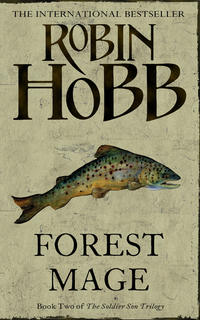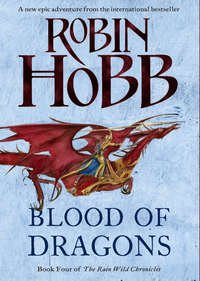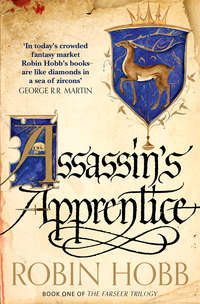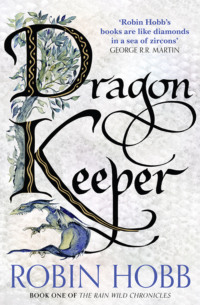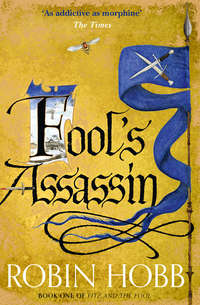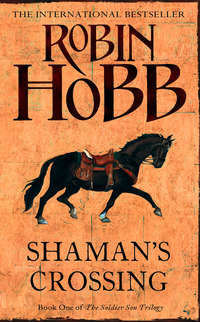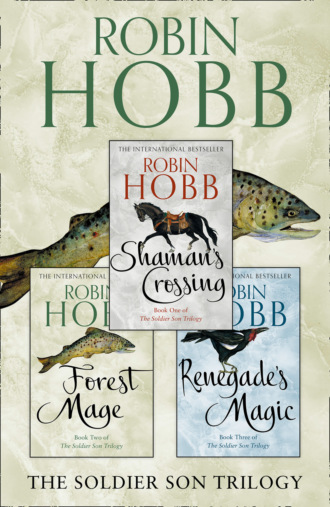
Полная версия
I turned to my father in horror. ‘They murdered him!’
Captain Rhosher had already left us and was running toward the ladder that led to the upper deck. One of our plainsmen polemen was faster. He did not use the ladder, but scrambled up the side of the cabins to the upper deck, where he seized their gun. The poleman threw it wildly away from him, and it sailed over the side of the boat, splashed and sank. A moment later the guide, probably alerted by the gunshot, was on the scene. He seized the plainsman and spoke to him in his own language, forcibly holding him off the two young nobles as the captain hurried up the ladder. Down on the deck, the other poleman was running frantically up and down the length of the flatboat, scanning the river for any sign of the wind-wizard. I ran to the railing and leaned out as far as I could. In the darkness, I could barely make out our wake. ‘I can’t see him!’ I called out.
A moment later my father joined me at the railing. He took my arm. ‘We are going to our cabin, Nevare. This is none of our doing, and none of our business. We shall stay clear of it.’
‘They shot the wind-wizard!’ My heart was hammering with the shock of what had happened. ‘They killed him.’
‘They shot his sail. The iron pellet destroyed the magic he was doing. That was all,’ my father insisted.
‘But I can’t see him!’
My father glanced at the water, and then pulled firmly at my arm. ‘He’s probably swum to shore. He’d be far astern of us by now; that’s why you can’t see him. Come on.’
I went with him, but not eagerly. On the upper deck, Captain Rhosher was shouting at the guide about keeping ‘those drunken youngsters under control’ while one of the young men in question was complaining loudly about the cost of the gun that had been thrown overboard and demanding that the captain compensate him. The poleman on the upper deck was shouting something in his own language and angrily shaking a fist. The captain still stood between him and the others.
I followed my father numbly to our cabin. Once inside, he lit the lamp and then shut the door firmly as if he could shut out what had happened. I spoke determinedly. ‘Father, they killed that man.’ My voice shook.
My father’s voice was thick but calm. ‘Nevare, you don’t know that. I saw the pellet shred his canvas. But even if some struck him, at that range it would probably barely penetrate his skin.’
I was suddenly impatient with his rationality. ‘Father, even if they didn’t shoot him, they caused him to drown. What’s the difference?’
‘Sit down.’ He spoke the command flatly. I sat, more because my knees were shaking than because I wished to obey him. ‘Nevare, listen to me. We don’t know that any pellet hit him. We do not know that he drowned. Unfortunately, the current is in command of us at the moment. We cannot go back to be certain of his death or his survival. Even if we could go back, I doubt that we could be certain. If he drowned, the river has taken him. If he lived, he has reached the bank and is probably gone by now.’ He sat down heavily on his bunk, facing me.
I was suddenly at a loss for words. The amazement I’d felt at the sight of the wind-wizard and the callous way in which the two hunters had ended his remarkable feat warred in me. I desperately wanted to believe my father was right, and that the wizard had escaped lasting harm. But I also felt a strange hurt deep inside me, that they had so thoughtlessly snuffed out a wondrous thing. I had glimpsed him so briefly but in that moment I had felt I would have given anything, anything at all, to know the power that he channelled so effortlessly into his craft. I clasped my hands in my lap. ‘I’ll probably never see anything like that again.’
‘It’s possible. Wind-wizards were never common.’
‘Father, they deserve punishment. Even if they didn’t kill him, they could have. At the very least, they sank his boat and caused him needless injury with their recklessness. For what? What had he done to them?’
My father did not answer my last question. He said only, ‘Nevare, on a ship the captain is the law. We must let the captain handle this. Our interference could only make matters worse.’
‘I do not see how they could be worse.’
My father’s voice was mild as he observed, ‘It could be worse if the plainsmen were stirred to outrage over this incident. If our captain is wise, he will swiftly shed those two and their guide, but before he does, he will see that they pay an ample amount of coin to the two plainsmen who witnessed it. Unlike Gernians, plainsmen see nothing dishonourable about being bought off. They feel that as no death can be righted and no insult completely revoked, there is nothing wrong with taking coin as an indication that the culprit wishes he could undo his mistake. Let Captain Rhosher handle it, Nevare. This is his command. We shall not say or do any more about this incident.’
I did not completely agree with his argument, but I could think of no better alternative. At the next town, the hunters, their guide and their trophies were unceremoniously off loaded. I did not see the plainsmen polemen after that, but I never found out if they quit or were discharged or simply took their bribe and left. We picked up two more deckhands and departed within an hour. The captain was obviously disgruntled about the whole incident. None of us spoke about it again, but that is not to say it did not trouble me.
We were the sole passengers for the rest of the journey. The weather turned rainy and cooler. As we slowly approached the juncture where the Tefa River meets the surging flood of the Ister River, the land changed. Prairie gave way to grasslands and then forest. We began to see foothills and beyond them distant mountains to the south. Here the two great rivers converged around a rich isthmus of land to form the Soudana River that flows in a torrent to the sea. Our plan was to disembark at the city of Canby and there change to a passenger jankship for the remainder of our journey. My father was very enthused about this next leg of our trip.
It had become quite fashionable for touring parties to come upriver by carriage and wagon, seeing all the country and staying at inns along the way. Canby was gaining the reputation of being both summer resort and trade centre, for it was said that the best prices in the west for plainsworked goods and furs were there. The jankships that moved slowly upriver by the ponderous processes of poling, sailing, and cordelling went downriver a great deal faster. Once they had been almost entirely sheep and cargo vessels. Now the eighty foot vessels were grandly appointed with elegant little cabins, dining and gambling salons, and deck-top classes in watercolours, poetry and music for the ladies. We would make the final leg of our journey to Old Thares on such a vessel, and my father had emphasized that he wished me to show well in this, my first introduction to society.
We were a few days away from making port at Canby when I awoke one morning to a smell at once strange and familiar in my nostrils. It was scarcely dawn. I heard the lapping of the river against the drifting flatboat, and the calls of early morning birds. It had rained steadily through the night, but the light in the window promised at least a brief respite from the downpour. My father was still sleeping soundly in his bunk in the flatboat cabin we shared. I dressed quickly and quietly, and padded out onto the deck barefoot. A deckhand nodded wearily at me as I passed him. A strange excitement that I had no name for was thrilling in my breast. I went directly to the rail.
We had left the open grasslands behind in the night. On both sides of the river, dark forest now stretched as far as the eye could see. The trees were immense, taller than any trees I had ever imagined, and the fragrance from their needles steeped the air. The recent rains had swollen the streams. Silvery water cascaded down a rocky bed to join its flood with the river. The sound of the merging water was like music. The damp earth steamed gently and fragrantly in the rising sun. ‘It’s so beautiful and restful,’ I said softly, for I had felt my father come out to stand on the deck behind me. ‘And yet it is full of majesty, also.’ When he did not reply, I turned, and was startled to find that I was still quite alone. I had been so certain of a presence nearby that it was as if I had glimpsed a ghost. ‘Or not glimpsed one!’ I said aloud, as if to waken my courage and forced a laugh from my throat. Despite the empty deck, I felt as if someone watched me.
But as I turned back to the railing, the living presence of so many trees overwhelmed me again. Their silent, ancient majesty surrounded me, and made the boat that sped along on the river’s current a silly plaything. What could man make that was greater than these ranked green denizens? I heard first an isolated bird’s call, and then another answered it. I had one of those revelations that come as sudden as a breath. I was aware of the forest as one thing, a network of life, both plant and animal, that together made a whole that stirred and breathed and lived. It was like seeing the face of god, yet not the good god. No, this was one of the old gods, this was Forest himself, and I almost went to my knees before his glory.
I sensed a world beneath the sheltering branches that crossed and wound overhead, and when a deer emerged to water at the river’s edge, it seemed to me that my sudden perception of the forest was what had called her forth. A log, half-afloat, was jammed on the riverbank. A mottled snake nearly as long as the log sunned on it, lethargic in the cool of morning. Then our flatboat rounded a slight bend in the river, and startled a family of wild boar that was enjoying the sweet water and cool mud at the river’s edge. They defied our presence with snorts and threatening tusks. The water dripped silver from their bristly hides. The sun was almost fully up now, and the songs and challenges of the birds overlapped one another. I felt I had never before comprehended the richness of life that a forest might hold, nor a man’s place in it as a natural creature of the world.
The trees were so tall that even from the boat’s deck, I craned my neck to see their topmost branches against the blue sky of early autumn. As we drifted with the river, the nature of the forest changed, from dark and brooding evergreen to an area of both evergreen and deciduous trees gone red or gold with the frosts. It filled me with wonder to stare at those leafy giants and recognize the still life that seeped through their branches. It was strange for a prairie-bred youth to feel such an attraction to the forest. Suddenly the wide sweeping country that had bred me seemed arid and lifeless and far too bright. I longed with all my heart to be walking on the soft carpet of gently rotting leaves beneath the wise old trees.
When a voice spoke behind me, I startled.
‘What fascinates you, son? Are you looking for deer?’
I spun about, but it was only my father. I was as startled to see him now as I had been surprised not to see him earlier. My conflicting thoughts must have given me a comical expression, for he grinned at me. ‘Were you day-dreaming, then? Homesick again?’
I shook my head slowly. ‘No, not homesick, unless it is for a home I’ve never seen until now. I don’t quite know what draws me. I’ve seen deer, and a snake as long as a log, and wild boar coming down to water. But it isn’t the animals, Father, and it’s not even the trees, though they make up the greater part of it. It’s the whole of it. The forest. Don’t you feel a sense of homecoming here? As if this is the sort of place where men were always meant to dwell?’
He was tamping tobacco into his pipe for his morning smoke. As he did so, he surveyed my forest in bewilderment, and then looked back at me and shook his head. ‘No, I can’t say that I do. Live in that? Can you imagine how long it would take to clear a spot for a house, let alone some pasture? You’d always be in the gloom and the shade, with a pasture full of roots to battle. No, son. I’ve always preferred open country, where a man can see all around himself and a horse goes easily, and nothing stands between a man and the sky. I suppose that’s my years as a soldier speaking. I’d not want to scout a place like that, nor fight an engagement there. Would you? The thought of defending a stronghold built in such a thicket as that place daunts me.’
I shook my head. ‘I had not even imagined battle there, sir,’ I said, and then tried to recall what I had been imagining. Battle and soldiering and cavalla had no place in that living god. Had I truly been longing to live there, amongst the trees, in shade and damp and muffled quiet? It was so at odds with all that I had planned for my life that I almost laughed out loud. It was as if I had suddenly been jarred out of someone else’s dream.
My father finished lighting his pipe and took a deep draw from it. He let the smoke drift from his mouth as he spoke. ‘We are at the edge of old Gernia, son. These forests used to mark the edge of the kingdom. Once, folk thought of them as the wild lands, and we cared little for what was beyond them. Some of the noble families had hunting lodges within them, and of course we harvested lumber from them. But they were not a tempting place for farmer or shepherd. It was only when we expanded beyond them, into the grasslands and then the plains that anyone thought to settle here. Two more bends of the river, and we’ll be into Gernia proper.’ He rolled his shoulders, stretching in a gentlemanly way, and then glanced down at my feet and frowned. ‘You do intend to put on some boots before you come to breakfast, don’t you?’
‘Yes, sir. Of course.’
‘Well, then. I will see you at table, shortly. Beautiful morning, isn’t it?’
‘Yes, sir.’
He strolled away from me. I knew his routine. He would next check on the horses in their deck stalls, he’d have a sociable word or two with the steersman and then return to our stateroom briefly and thence to the captain’s table for breakfast, where I would join them.
But I still had a few more moments to enjoy the forest. I reached for that first consciousness that I’d had of it, but could not reattain that state of heightened awareness. The old god that was Forest had turned his face away from me. I could only see it as I had seen it all my life, as trees and animals and plants on a hillside.
The sun was rising higher; the man on the bow was calling his soundings and the world glided past us. As my father had predicted, we were nearing a slow bend in the river. I went back to our stateroom to put on my boots, and to shave. My hair was already growing out to annoying stubble that could not be combed. I hastily made the bed I had so quickly abandoned at dawn and then headed to the captain’s small salon for breakfast.
The captain’s salon and table were unpretentious on such a small vessel. I think my father enjoyed the informality. As they did every morning, he and Captain Rhosher exchanged pleasantries about the weather and discussed what the day’s travel might bring. For the most part, I ate and listened to the conversation. The meal was not elaborate but the portions were generous and the food was honest. Porridge, bacon, bread, fresh apples, and a strong morning tea made up the most of it. I was happy to fill my plate. My father praised the ship’s rapid progress through the night.
‘It was a good run, with a strong moon to light our way. But we can’t expect the same tonight, or even for the rest of the day. Once we go past Loggers, the river will be thick with log rafts. Those are bad enough to get around, but worse are the strays. The river has gone silty, with shallows growing where they never were before. Wedge a stray log in a sandbar, let us run upon it blind, and we’ll hole our hull. The lookout and the sounder will work for their wages today, as will our polemen. Still, I foresee that we’ll make Canby as scheduled.’
They went on to discuss our disembarkment there and which jankship my father should book our passage on. Our captain made gentle mock of the big vessels, saying that my father was not interested in their speed but only desired the novelty of the experience and the company of the lovely ladies and elegant gentlemen who preferred such distinctive travel to his own simple ship.
As my father was laughingly denying this, I became aware of a very unpleasant smell. Manners required that I ignore it, but it quickly quenched my appetite and soon began to make my eyes tear. With every passing moment, the smoky odour grew stronger. I glanced toward the small galley, wondering at first if something had been neglected on the ship’s little oil stove. But no visible smoke was emanating from there. The stench grew stronger. It had the most peculiar effect on me. It was not just that it greatly displeased my nose and irritated my throat. It woke in me a sense of terror, a panic that I could scarcely smother. It was all I could do to stay in my chair. I tried to dab at my streaming eyes discreetly with my napkin. Captain Rhosher grinned at me sympathetically. ‘Ah, that’ll be the sweet aroma of Loggers getting to you, lad. We’ll have thick breathing for the next day or so, until we’re past their operations. They’re burning the trash wood, the green branches and viney stuff, to get it out of the way so the teams can get up and down the hills easier. Makes for a lot of smoke. Still, it’s not as bad as that operation they had going on further down the river two years ago. That company would just set fire to the hillside, and burn off the underbrush. Anything big enough to be left standing, they harvested right away, to beat the worms to it. Fast money, but a terrible lot of waste, that was how I saw it.’
I nodded at his words, scarcely comprehending them. The end of breakfast could not come too soon for me, and as soon as I politely could, I left the table, foolishly thinking to find fresher air outside.
As I stepped out onto the deck, an inconceivable sight met my eyes. The day was dimmed by wood smoke hanging low in the air. The lower half of the hillside on the port side of the boat was stripped of life. Every tree of decent size had been cut. The raw stumps were jagged and pale against the scored earth. The remaining saplings and undergrowth were crushed and matted into the earth where the giants had fallen and been dragged over them to the river. Smoke was rising from heaped and smouldering branches; the hearts of the fires burned a dull red. The hillside scene reminded me of a large dead animal overcome by maggots. Men swarmed everywhere on the hillside. Some cut the limbs from the fallen giants. Teamsters guided the harnessed draught horses that dragged the stripped logs down to the river’s edge. The track of their repeated passage had cut a deep muddy furrow in the hill’s flank, and the rainfall of the last few days had made it a stream, dumping into the river that here ran thick with muck. The brown curl of it wavered out into the river’s current like a rivulet of clotting blood. Stripped logs like gnawed bones rested in piles at the river’s edge, or bobbed in the shallows. Men scuttled about on the floating logs with peevees and lengths of chain and rope, corralling the logs into crude rafts. It was carnage, the desecration of a god’s body.
On the upper half of the hill logging teams ate into the remaining forest like mange spreading on a dog’s back. As I watched, men in the distance shouted triumphantly as an immense tree fell. As it went down, other, smaller trees gave way to its fall, their roots tearing free of the mountain’s flesh as they collapsed under its mammoth weight. Moments after the swaying of branches ceased, men crawled over the fallen tree, bright axes rising and falling as they chopped away the branches.
I turned aside from the sight, sickened and cold. A terrible premonition washed over me. This was how the whole world would end. No matter how much of the forest’s skin they flayed, it would never be enough for these men. They would continue over the face of the earth, leaving desecration and devastation behind them. They would devour the forest and excrete piles of buildings made of stone wrenched from the earth or from dead trees. They would hammer paths of bare stone between their dwellings, and dirty the rivers and subdue the land until it could recall only the will of man. They could not stop themselves from what they did. They did not see what they did, and even if they saw, they did not know how to stop. They no longer knew what was enough. Men could no longer stop man; it would take the force of a god himself to halt them. But they were mindlessly butchering the only god who might have had the strength to stop them.
In the distance I heard the shouts of warning and triumph as another forest giant fell. As it went down, a huge flock of birds flew up, cawing in distress and circling the carnage as crows circle a battlefield. My knees buckled and I fell to the deck, clutching at the railing. I coughed in the thick air, gagged on it, and coughed some more. I could not catch my breath, but I do not think it was the smoke alone that choked me. It was grief that tightened my throat.
One of the deckhands saw me go down. A moment later, there was a rough hand on my shoulder, shaking me and asking me what ailed me. I shook my head, unable to find words to express my distress. A short time later, my father was at my side, and the captain, his napkin still clenched in his hands.
‘Nevare? Are you ill?’ my father asked solemnly.
‘They’re destroying the world,’ I said vaguely. I closed my eyes at the terrible sight, and forced myself to my feet. ‘I … I don’t feel well,’ I said. Some part of me didn’t wish to shame myself before my father and the captain and crew. Some other part of me didn’t care; the enormity of what I had glimpsed was too monstrous, and suddenly too certain. ‘I think I’ll go back to bed for a while.’
‘Prob’ly the stink from all those fires,’ Captain Rhosher said sagely. ‘That smoke’s enough to make anyone sick. You’ll get used to it, lad, in a few hours. Stinks a lot less than Old Thares on an early morning, believe me. We’ll be past it in a day or so, if all those damn log-rafts don’t block our way. A menace to navigation, they are. Time was, good stone was the only thing a rich man would build with. Now they want wood, wood, and more wood. ’Spect they’ll go back to honest stone when this last strip is gone. Then we’ll see the quarries bustle again. Men will do whatever brings in the coin. I’ll be glad when they’ve cut the last timber on that hill and the river can run clear again.’
Конец ознакомительного фрагмента.
Текст предоставлен ООО «ЛитРес».
Прочитайте эту книгу целиком, купив полную легальную версию на ЛитРес.
Безопасно оплатить книгу можно банковской картой Visa, MasterCard, Maestro, со счета мобильного телефона, с платежного терминала, в салоне МТС или Связной, через PayPal, WebMoney, Яндекс.Деньги, QIWI Кошелек, бонусными картами или другим удобным Вам способом.




